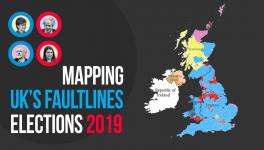Tory-DUP Agreement Threatens to Jeopardise Irish Peace Accord

Image Courtesy: belfastlive
The Theresa May government of the United Kingdom has been under fire in recent weeks for its 'confidence and supply' agreement with the Democratic Unionist Party (DUP) in order to cling to power. The controversial deal seeks to ensure that May stays in power with DUP support, in exchange of an ‘extra’ £1 billion of funding for hospitals, schools, and roads in Northern Ireland. There are widespread apprehensions that the agreement would jeopardise the Irish Peace Accord.
A recent article by The Independent reported that a crowd-funding initiative to mount a potential legal challenge against the parliamentary deal between the Conservatives and the DUP has reached its required target of £20,000. The agreement had been arrived at after the ruling Conservative Party failed to secure a majority on its own in the 2017 UK elections.
Cirian McClean of the Green Party, who launched the crowd-funding initiative against the deal, sees the agreement as a violation of both the Bribery Act and the landmark Good Friday Agreement.
McClean told the Guardian that the deal could be construed as "a bribe to patch together a parliamentary majority." The interpretation of the Bribery Act and whether the arrangement was in fact an act of bribery will be ascertained by the High Court. There are more alarming implications of this deal, especially with regards to the Good Friday Agreement.
Almost two decades ago, the 'Good Friday Agreement' was signed between the British Government, the government of the Republic of Ireland and the political parties of Northern Ireland. The agreement is especially significant as it marks the end of 'The Troubles', a thirty year period of conflict centred around the historically disputed constitutional status of Northern Ireland. The Troubles began on 5 October 1968 when there was police violence against people participating in a civil rights march. Subsequently, widespread rioting and civil obedience followed in Northern Ireland.
The Good Friday agreement includes a provision that the U.K. government should act “with rigorous impartiality on behalf of all the people in the diversity of their identities and traditions” in Northern Ireland. Mr. McClean argues that any deal between the UK government and the DUP is in violation of the same. He maintained that the £1bn aid would not be of much benefit to Northern Ireland and could instead prove to be detrimental to the institutions of Northern Ireland.
John Major, former Prime Minister and one of the architects of the peace process, shared similar concerns in an interview with BBC Radio 4. While acknowledging that he was “wary” and “dubious” about the deal, he maintained that his primary concern was the peace process. “A fundamental part of that peace process is that the U.K. government needs to be impartial between all the competing interests in Northern Ireland. And the danger is that however much any government tries, they will not be seen to be impartial if they are locked into a parliamentary deal at Westminster with one of the Northern Ireland parties”, he added.
Major also emphasised that the coalition could complicate Brexit negotiations, if there were to be a problem with the Northern Ireland executive (Parliament) during the Brexit process.
David Davis, the Brexit Secretary for the UK, gave evidence to the House of Lords committee last Tuesday. He said that the plan on how to achieve an “invisible border” between Northern Ireland and the Republic of Ireland was “not near resolution”. He stated that this was “partly because we’ve got no Northern Ireland executive to deal with, partly because of the change in government in the south.”
Talks of power sharing at Stormont (the seat of the Northern Ireland Assembly) have failed repeatedly since the collapse of the arrangement in January this year. Sinn Féin and the DUP, the largest parties in Northern Ireland, have exceeded the latest deadline (29 June) to set up the devolved government. With the two parties being diametrically opposed on nearly all issues, an absence of a functional executive in Northern Ireland would only complicate matters.
Major believes that the UK government would have to act as an "honest broker" in order to resolve such problems, but this becomes problematic when a significant population of the North Irish community ceases to see them as that. The uncertainty over what such an event could result in, would be of deep concern.
The consequences of the Tory-DUP coalition, beyond the short-term goal of consolidating power, remain unforeseeable. It may well turn out that it does not affect the peace process in Northern Ireland. But what is of concern is that the Conservative government is willing to leverage the integrity of Northern Irish peace process, and the long-term stability and integration of the state for its short term political survival.
Get the latest reports & analysis with people's perspective on Protests, movements & deep analytical videos, discussions of the current affairs in your Telegram app. Subscribe to NewsClick's Telegram channel & get Real-Time updates on stories, as they get published on our website.
























